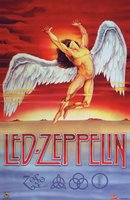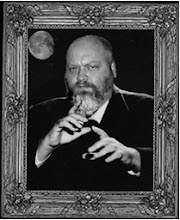In appreciation of Jimmy Page
 An excerpt from Erik Davis' Led Zeppelin (33 1/3):
An excerpt from Erik Davis' Led Zeppelin (33 1/3):In fairness, it must be said that many rock bards name Black Sabbath rather than Zeppelin as the true font of heavy metal. After all, Sabbath pack an unparalleled eldritch punch, and in many ways represent a purer source of bane: the riffs more consistently morbid, the stance more prole, and the whole shtick more out-of-nowhere and hence more monstrous, more contrary to nature. But Zeppelin had a vaster palette, a more richly perfumed darkness; perhaps most importantly, they sold way more records. Like all origin stories, this one depends on your frame of reference, your own lineages, your taste. It’s very much like the question of who deserves blame for the genre of heroic fantasy, whose multi-volume sagas of dwarf-lords and magic blades continue to clog the SF sections of bookstores. Hardcore sword-and-sorcery buffs will rightly name the pulp peregrinations of Robert E. Howard’s Conan, while more literary types will nominate, with equal justification, Tolkien’s Lord of the Rings. Sabbath is Conan; Zeppelin is Lord of the Rings.
But Zeppelin is a special sort of Lord of the Rings, one where you get to root for both sides. Whatever its biographical basis, Page’s apparent diabolism is counterbalanced with the bucolic hippie paganism concentrated in the lyrics, persona and hairstyles of Robert Plant. Led Zeppelin derives much of their mythic power from this seductive but disturbing ambiguity. Who do Zeppelin swear fealty to? The devil or the sun? Mordor or Middle-earth? Is Faery really just a theme park of Hell? The polarity between Page and Plant is even reflected in their very names. The plant is the pure green spunk of earth, whereas the page is a work of man, a skeletal void upon which we inscribe our plots and spells.
A similar polarity underlies Page’s persona, and helps to explain the aura of magical power that characterizes his mystique. Susan Fast cites one fan survey focused on the guitarist: "He is the sage. He knows how to take chances and make it work. He is the producer and ultimate architect of the goods." On the surface, Page’s live performances present typical rockist values of spontaneity, virtuosity, and sweaty abandon. But Page adds a novel element to the figure of the guitar hero, an element that Steve Waksman has identified as mystery. So even as Page bares his cock rock before tens of thousands of fans, the Zoso doodle emblazoned on his clothes and amp remind us that he knows something that we don’t. There is a gap between the hero whose performance we consume and the sage behind the curtain, who remains concealed, literally occult. This mystique makes Page far creepier than Ozzy, who is hiding nothing, except maybe his debt to The Munsters.
Though rooted in Page’s personal reserve and esoteric interests, the guitarist’s mystique is also structurally reflected in his musical practice. Page’s live virtuosity was leavened by the fact that he was notoriously sloppy, constantly picking up and discarding ideas with an air of carelessness, even distraction. In the heat of performance, it often seemed like a part of him was somewhere else, at a wise or possibly addled remove. Yet this sloppiness suggested that he had even mastered chance, and could “make it work.” This element of hidden mastery is the key, for behind the scenes, Page was an architect of control: a hands-on producer, a sometimes martinet in the studio, and a tight-fisted investor who, along with Peter Grant, helped wrest unprecedented financial and artistic control away from his record company. This air of cunning underlies his mystique. Onstage, he would occasionally direct the other members like a conductor, a performance that Jones has insisted was largely for show.


0 Comments:
Post a Comment
<< Home